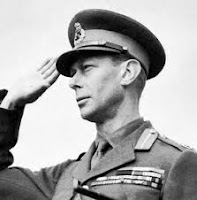6 February was the sixtieth anniversary of the accession of the Queen. Normally the royal family does not celebrate this date, because it is also the anniversary of the death of the Queen’s father, King George VI.
George VI was a shy, unassuming family man who had no wish to be king. Following the abdication of Edward VIII, however, he took up the duty and performed it admirably, leading the nation, the Empire and the Commonwealth through the Second World War.
’Personally, I feel happier now that we have no allies to be polite to,’ he wrote after the fall of France in 1940. He and the Queen and the Princesses Elizabeth and Margaret stayed at Windsor throughout the war. The King and Queen travelled daily to London or other areas that had been bombed. When it was suggested that the Princesses should be sent to Canada for safety, the Queen is said to have replied ‘Our daughters could not go without me. I cannot leave the King. And the King will never leave.’
The King had served in the Royal Navy in the First World War. He very much wanted to be present, on board HMS Belfast, at the D-Day landings in June 1944. However, he was persuaded not to go by his advisers, who said that it would be too great a responsibility for Belfast’s commander to have him on board, and too great a blow to morale if he should be killed. The King then had the task of convincing Winston Churchill, who had also planned to be on board HMS Belfast, that he too should not take the risk.
The King was able to visit the Normandy beach head, and General Montgomery’s headquarters, ten days after the landings.
The stress of kingship during such a critical period is said to have contributed to the deterioration of the King’s health from the late 1940s. He died in 1952 aged 56.






